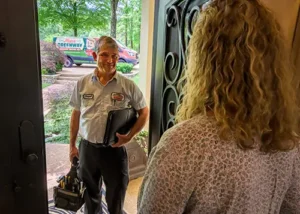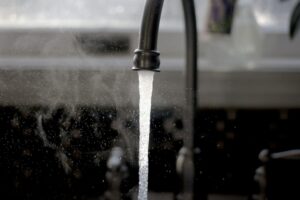Just How Precise Is Electronic Leak Detection? The Real Scoop
Hey there! If you’ve ever woken up to that dreaded sound of dripping water or opened a water bill that made your jaw drop, you know the panic that comes with mystery leaks. The tricky part isn’t just knowing you have a leak—it’s figuring out exactly where that sneaky water is escaping without destroying your home in the process.
That’s where electronic leak detection comes into the picture. But if you’re like me, you’ve probably wondered: “Does this tech actually work? Let’s dive into the world of electronic leak detection and find out how accurate it is.
What’s This Electronic Leak Detection Thing Anyway?
Electronic leak detection (ELD for short) is a high-tech way to find leaks without the demolition crew. Before this technology came along, finding a leak often meant following the trail of water damage and making educated guesses, which usually led to unnecessary holes in walls, torn-up floors, or excavated yards.
Instead, ELD uses specialized equipment to detect leaks in your plumbing, swimming pool, or underground pipes without all the destruction. Think of it as giving plumbers x-ray vision (sort of).
The tech relies on various methods including:
- Acoustic sensors that listen for escaping water (like a super-powered stethoscope)
- Infrared cameras that spot temperature differences caused by moisture
- Tracer gases that find their way through even the tiniest cracks
- Moisture meters that measure exactly how damp materials are
Each approach has its time and place, depending on where your suspected leak is hiding.
The Million-Dollar Question: How Accurate Is It?
Let’s cut to the chase electronic leak detection is impressively accurate, often pinpointing leaks within just a few inches of their actual location. But (there’s always a but, right?) the precision varies depending on several factors including the detection method, the type of leak, and honestly, how experienced your technician is.
Let me break down the accuracy by method so you know what to expect:
Acoustic Leak Detection (The Listening Method): 90-98% Accurate
This is probably the most common method you’ll encounter. It works by using super-sensitive microphones that pick up the sound of water escaping from pipes—sounds your ears could never detect.
When it shines:
- For pressurized pipes where water is actively flowing out
- In relatively quiet environments (your peaceful suburban home? Perfect!)
- With pipe materials that conduct sound well (like copper or PVC)
When accuracy might dip:
- If your leak is more of a slow drip than a steady flow
- In noisy environments (like near a busy street or mechanical room)
- With old cast iron pipes that might muffle the sound
In optimal conditions, acoustic detection can pinpoint a leak within 2-3 inches of its source. Pretty impressive, right?
Thermal Imaging (The “See Through Walls” Method): 85-95% Accurate
I find this method particularly fascinating. Thermal cameras detect temperature differences, showing cooler areas where water might be present (since evaporating water creates cooling).
When it works best:
- For leaks behind drywall or under flooring
- When the leak is active enough to create a temperature difference
- For finding broader areas of water intrusion
When it might struggle:
- If the leak is very small or has temporarily stopped
- When other factors might affect temperature (like an AC vent nearby)
- If the surface has completely dried out
Thermal imaging might not pinpoint a leak down to the exact inch, but it’s excellent for narrowing down the search area without making a single hole in your wall.
Tracer Gas Detection (The “Send In The Spy” Method): 95-99% Accurate
This is the heavy artillery of leak detection—when other methods can’t find your elusive leak, tracer gas often can. Technicians inject harmless gases (usually helium or hydrogen mixed with nitrogen) into your plumbing system. Since these gases are lighter than air, they escape through even microscopic leaks.
When it’s practically flawless:
- For finding super tiny leaks other methods miss
- When pinpoint accuracy is crucial
- For underground or inaccessible pipes
When results might vary:
If your system isn’t properly sealed (the gas needs to be contained to work effectively)
- For very large plumbing systems where the gas might become too diluted
- With experienced technicians, tracer gas can locate leaks with near-perfect accuracy, often within half an inch of the source!
- What Makes Leak Detection More (or Less) Accurate?
Several factors can affect how precisely your leak can be located.
The Type of Leak Matters—A Lot
Not all leaks are created equal. Some practically announce themselves while others play hard to get:
- Pressurized pipe leaks (like in your main water line) are the easiest to find because they’re actively pushing water out and making noise.
- Slow drips (like in drain lines) can be much tougher to locate since they don’t create much sound or pressure.
- Intermittent leaks are the most challenging—if your pipe only leaks when certain conditions are met (like when water pressure reaches a specific level), detection might take longer.
Your Plumbing Material Makes a Difference
The pipes in your home can either help or hinder the detection process:
- Copper pipes are fantastic for acoustic detection because they conduct sound beautifully.
- PVC and plastic pipes absorb more sound, making leaks a bit harder to hear.
- Old galvanized or cast iron pipes can be the most challenging because corrosion inside the pipes can mask the sound of leaks.
Background Noise Can Interfere
The environment around your leak plays a surprising role in detection accuracy. Trying to find a leak in a busy downtown building with traffic and machinery? Challenging. Working in a quiet suburban home during the middle of the day? Much easier.
The Human Factor Is Huge
Here’s something people don’t talk about enough—the skill of your technician makes an enormous difference:
- Experienced pros can distinguish between the sound of a leak and other plumbing noises.
- They know how to interpret thermal images correctly, accounting for other heat sources.
- They understand how to prepare a system properly for tracer gas testing.
This is why choosing a reputable company with well-trained technicians is critical for accurate results.
Is It Actually Worth Spending Money On?
In a word, absolutely.
- It prevents unnecessary damage – No need to cut multiple exploratory holes or dig up your entire yard based on guesswork.
- It saves significant money in the long run – Finding a leak early means less water damage, lower water bills, and avoiding mold remediation (which can cost thousands).
- It’s versatile – Whether you’re dealing with plumbing issues, pool leaks, roof problems, or even gas line concerns, ELD has you covered.
- It’s efficient – Most leak detection can be completed in a few hours rather than days of destructive searching.
When Should You Call in the Electronic Leak Detectives?
You should consider electronic leak detection if:
- Your water bill has suddenly spiked for no apparent reason.
- You can hear the sound of running water when all fixtures are turned off.
- You’ve noticed damp spots, warping, or discoloration on walls, ceilings, or floors.
- There’s a persistent musty smell that might indicate hidden moisture.
- Your water pressure has mysteriously dropped. You’ve noticed cracks in your foundation that could be from water erosion.
- Your water meter keeps running even when no water is being used.
The Bottom Line: Trust, But Verify
With accuracy rates between 90-99% in the hands of skilled technicians, electronic leak detection is impressively reliable—far more so than the old “guess and dig” approach. It’s the closest thing we have to x-ray vision for your plumbing and structure.
That said, no technology is perfect 100% of the time. The most reputable leak detection companies will be upfront about this and may use multiple methods to confirm their findings before recommending repairs.
If you’re facing a mysterious leak, electronic detection offers the best chance of finding the culprit with minimal disruption to your home and wallet. And in my book, that makes it not just accurate, but invaluable.





